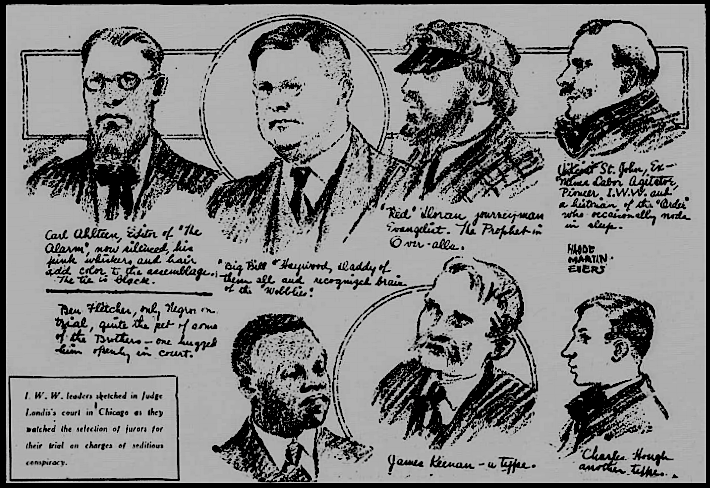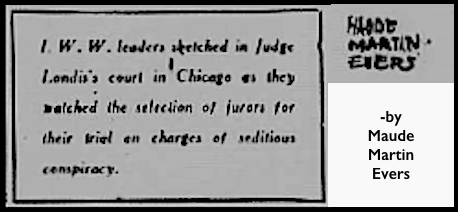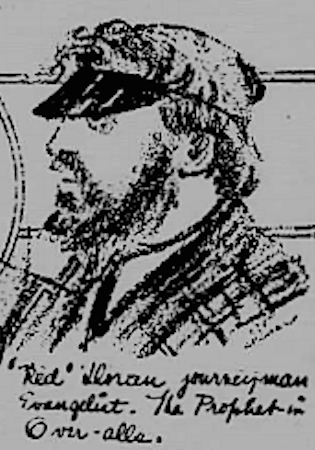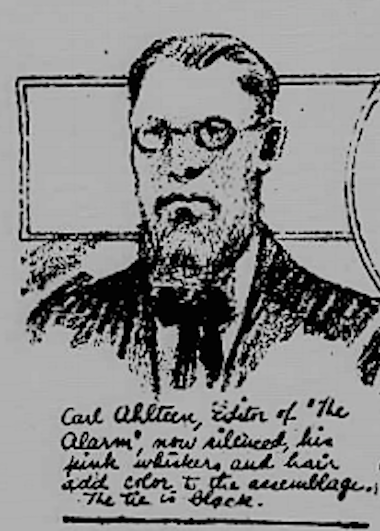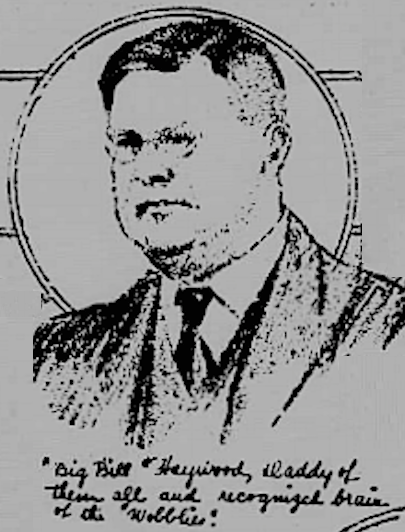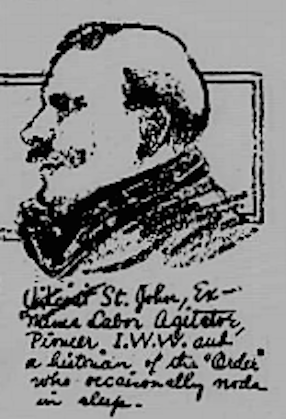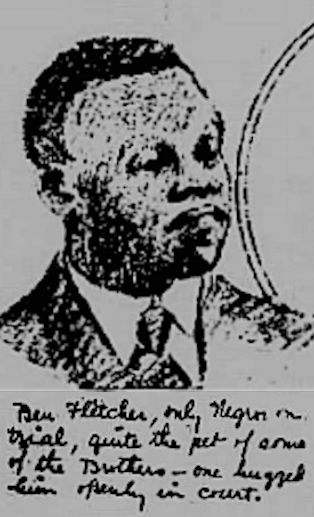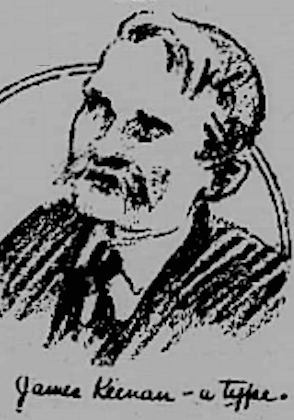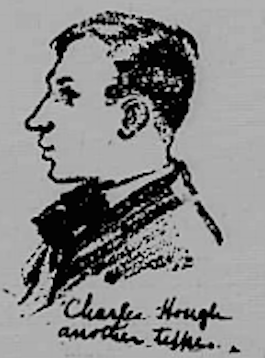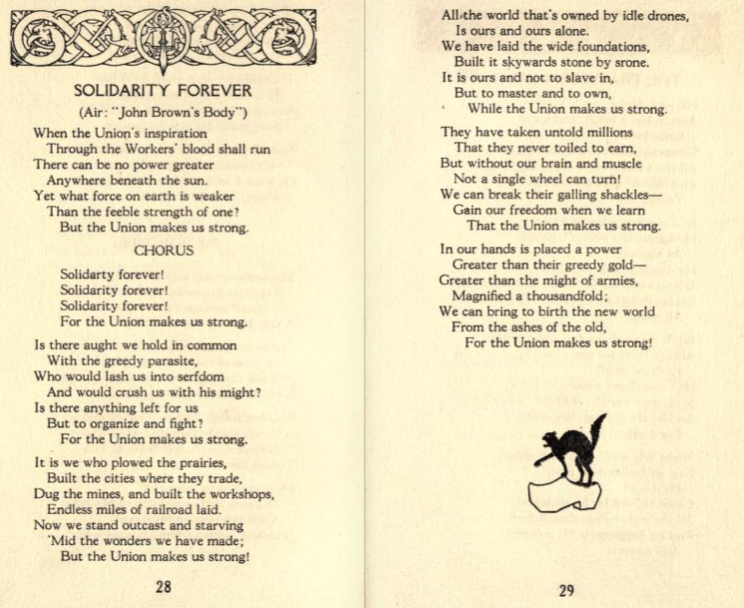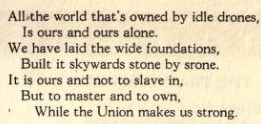
Hellraisers Journal, Wednesday April 17, 1918
As Chicago Trial Continues, IWW Found Guilty by Kept Press, Part II
Today we offer the conclusion of our two-part series featuring the article by Boyden R. Sparkes which appeared as a full-page spread in the April 14th edition of the New York Tribune.
THE I. W. W.: AN X-RAY PICTURE
Chicago Trial Shows Searing Sparks from the Anvil Where Industrial-Military Power is Being Forged Endanger Progress-
Sabotage, Malcontents’ Principal Weapon,
a Menace to Farm, Factory and Home.By Boyden R. Sparkes
Chicago, April 13, 1918.[Part II]
—–
“Red” Doran Tells The Way of Life
Doran, the red-bearded Socrate of the I. W. W., with his crimson mackinaw of the lumber camps, blue overalls and green eye-shade, look like a circus clown and talks in the restrained manner of an assistant professor of languages at Columbia.
Whether he talks with a construction camp “huskie” or a newspaperman, “Third Rail Red” starts out by saying:
Now you and I are fellow slave. You may not be aware of it, but am. I have no more nor no less to gain than you have. As a business proposition the I. W. W. will pay dividends from time to time in the form of shorter hours, more pay, better living conditions and social improvements, at the discretion the membership.
If you want to be a man, a real man, now is the time to get in on the ground floor of this proposition. Invest in a membership card. It will cost you $2.50 each month to keep in good standing.
The possession of a paid-up membership card is always accepted as proof conclusive that you really want to enjoy good food, good clothes, a family, your home and babies, and that you are a peaceful, liberty loving citizen imbued with the spirit of freedom and anxious to abolish those things that tend to human degradation.
This goes on for hours, for Red thoroughly enjoys talking. Then he winds up:
Stay with me, Jack, in the exercise of class industrial solidarity and there will be no bum jobs, hungry kids, poverty or unnecessary human suffering. They will all be good jobs and you and I and the kids will be happy and free. Believe me, I’m a fellow wage slave.
In the three rooms in the Federal building here, where are kept the huge files of evidence against the I. W. W., there are many copies of “Solidarity,” which until it was suppressed was edited by Ralph Chaplin, one of Bill Haywood’s right-hand men, and a conspicuous figure with Haywood on the bench in Judge Landis’s court, where sit the I. W. W. leaders who have been released on bail.
Many issues of this paper contain instructions to I. W. W. readers, printed in bold faced type, to claim exemption by writing on their claim: “I. W. W.; opposed to war.”
In their meetings the I. W. W. fly the red flag of anarchy. Their speakers preach to their untutored, unwashed followers that “there won’t be any bosses when the one big union has its day.” There aren’t any bosses in Russia just now other than Lenine and a few other fellow workers. The Bolsheviki of Russia have accomplished what the I. W. W. has been trying to accomplish in America. It is asserted in Chicago and not denied that a delegation of Bolsheviki are hiding out somewhere here among the Russian groups that never have been digested by America as the guests of the I. W. W. and awaiting the day when President Wilson will recognize the Bolshevik government of Russia. Clabaugh, of the United States Department of Justice, has some of his agents looking for these men, and if they are found they will be seized for unlawful entry. How they got a patriotic band singing “The Star-Spangled Banner,” but if he listened closely these are the words he would distinguish:
Tho blood and the lives of children and wives
Are ground into dollars for parasites’ pleasure.
The children now slave till they sink in their grave-
That robbers may fatten and add to their treasure.
Will you idly sit by unheeding their cry?
Arise! Be ye men! See the battle draws nigh.Then the chorus:
And the banner of labor will surely soon wave
O’er the land that is free from the master and slave.It is the tune of “The Star-Spangled Banner,” and the “wobbly” stands when he sings it.
That banner of labor referred to in the song is a red flag with the emblem of sabotage worked in the centre; the sabcat, a black puss with her back arched.
Any means to further the class war are approved by the I. W. W.-and he has used most of those available to Jacquerie anywhere. The attempted revolt has been referred to-there is a long list of cases of other violence that need not be repeated. But the main reliance of the organization, the keystone of its strategy, is sabotage.
The I. W. W. agitator says sabotage merely means to go slow on the job. “Fold your arms if the boss don’t suit you.” But he doesn’t really mean that, for the I. W. W. literature is filled with explicit instructions for the destruction of all kinds of property. The dissatisfied domestic who carries a red card-an unholy lot of them do-is taught that she can get even with the “Lady of the House” by introducing bed-bugs to the bed linen. The harvest hand in song and prose is told that he can tie up the farmer’s work by dropping his pitchfork into the thrashing machine.
If Luther Burbank were to turn his energies from vegetables to the animal kingdom and grow rattlesnake fangs on every pet dog in the land he would not accomplish a minute part of the mischief that the “wobbly” leader will if sabotage takes firm hold in America.
The Creed and The Litany
The government will produce in court, among other things, a book on sabotage, written by Walker C. Smith. It was distributed to “wobblies” over the land from the publication headquarters in 1001 West Madison Street here in Chicago.
Here is an extract that may yet cause the military authorities of the nation a world of trouble:
A bar of soap in the boiler (of railroad engine) would keep the soldiers at home or else force them to march to the strike.
If this were not possible there are water tank where the tender must be filled and the saboteur can “Let the Gold Dust Twins do the work.” The inference here is that powdered soap will accomplish the same purpose if thrown into the unguarded water supply tank at the side of the railroad tracks. Ah, it’s a noble creed!
It isn’t possible for anybody to dismiss the activities of the I. W. W. with a wave of the hand. They affect every soul in America. Haywood’s organizers have formed the housemaids of the nation into union. The domestic workers are told how they can practice sabotage. Some of it is familiar stuff, but it does seem that the inventors of printing would blush if they could read printed instructions to “hired girls” to seek better wages through these practices:
Choke the family on soup in which red pepper has been spilled.
Toughen the expensive steaks.
Let the finest china fall and break.
Serve salty sherbet at a bridge party.
Spill a pot of hot tea on the model frock of the honor guest.
Put too much starch on father’s favorite soft shirt.
There are other suggestions, revolting and unbelievable. The forms mentioned were employed by the Denver Union of Housemaids.
Pouget in his book, also distributed by the I. W. W., which believe in a “free” press, suggests that:
A farmhand can make a mistake with his scythe or hoe, or sow bad seeds in the field.
A salesman can put a stain on garments and cause them to be sold as damaged.
A tailor can spoil a suit clothes or a piece of cloth.
Cabinetmakers can deteriorate piece of furniture without the boss noticing it at first sight.
Here is an epigram from “Solidarity” that refers to slowing down work in the mines:
When the cat (the sabcat) sits on the pick handle brass buttons (soldiers) go to pot.
“The Industrial Worker,” another suppressed publication of the I. W. W. printed on the Pacific Coast significantly commented on the fact that the shipyard owned by Mayor Rolph, of San Francisco, had burned down two days before the closed shop was to go into effect. The I W. W., it will be remembered, considers itself bound to fight the system of craft unionism fostered by the American Federation of Labor.
Walker C. Smith’s book gleefully recounts how a farmer in the state of Washington, following a strike of his farmhands, procured a new crew. They worked for a while under his direction and then he left them alone. The next morning he discovered that 1,000 trees had been planted upside down.
Conditions That Help the Red Cause
Any one who has ever been within smelling distance of the bunk house of a lumber camp, where exhausted men seek to regain in sleep the strength they have spent perhaps in an all-day fight with perverse logs in ice cold water up to their hips, can get a fair idea of what causes a man to join the I. W. W. by spending a night in one of the vermin-infested bunks. The fetid atmosphere would make a horse shrink.
There will be one window and that nailed shut. The red hot stove will be surrounded by wet, steaming clothing smelling abominably. Nobody ever bathes in a lumber camp because there isn’t any place to bathe unless one rolls naked in a snowbank.
The dishwasher of the first cabin saloon of a transpacific liner is almost certain to carry a red card and listen intently to the discussions of social injustice that occupy the greasy looking assemblage that gather in the “glory hole” off watch.
The migratory workers who are the prey of unscrupulous employment agencies are another fruitful source of recruitment. No matter what his language-Bohemian, Armenian, Spanish or Hindu-there will be one who speaks his language who will preach the I. W. W. doctrines to him.
The harvest hands who flock to the fields and orchards in the summer perform a valuable service to the country. The I. W. W. agitator reminds these workers that they are given sleeping quarters not nearly so comfortable as those provided for the livestock on the farm. Going into the harvest fields the freight trainmen seem to have had some instructions to give the workers a boost. But when the harvest hand starts back for the town to spend his hard earned money he usually finds that it would have been cheaper to have bought a ticket, for the trainmen seem to know he has money and to expect some of it.
When Jim Rowan, head of the lumberjacks’ branch of the I. W. W., who has been beaten in and driven out of nearly every lumber camp in the Northwest, talks his fellow workers listen. Last August, Rowan, in Seattle, sent to Haywood in Chicago this letter:
Fellow Worker: The old bugaboo of “patriotism” is being preached on all sides.
We have the goodwill of the German people here and we feel that they are in sympathy with our cause. We do not call them Germans, however, but refer to them the same as others, the FELLOW WORKERS.
We are going to carry out our points if we have to stop every industry on the Pacific Coast. We did not declare war and we did not consented to the workingman giving up his liberty and being drafted.
And there you are. These particular leaders of the I. W. W.-such of them as have been rounded up-are to be tried. They may be sent to jail. Most of them expect to be, though they are to fighting hard to stay out. But if every I. W. W. in the land was put inside of stockades there soon would be more, for they are a result of a social system that says: “May the best man win and the devil take the hindmost.”
The I. W. W. is the hindmost.
[Details of sketches by Maude Martin Evers added.]
SOURCE & IMAGES
New York Tribune
(New York, New York)
-Apr 14, 1918, page 6 of part III
Part III- Editorials, Special Articles, Automobiles
https://chroniclingamerica.loc.gov/lccn/sn83030214/1918-04-14/ed-1/seq-28/
See also:
Hellraisers Journal, Tuesday April 16, 1918
As Chicago Trial Continues, IWW Found Guilty by Kept Press
As Jury Selection Continues in Chicago, New York Tribune’s Full-Page Article Finds IWW Guilty
For another drawing by Maude Martin Evers, Jan of 1918
(and for more search Google Images with her name in quotes):
http://lakecountyhistory.blogspot.com/2013/01/
Note: Boyden R Sparkes also covered the Battle of Blair Mt-see Fourth Estate of Sept 10, 1921 which tells the story of
how he was wounded by WV state troopers (+ short bio of Sparkes), also
tells story of woman reporter-she suffered hand wound-and “indignities” she suffered at hands of state troopers:
https://play.google.com/books/reader?id=9DZJAQAAMAAJ&printsec=frontcover&output=reader&hl=en&pg=GBS.RA10-PA2
Jacquerie
https://en.wikipedia.org/wiki/Jacquerie
Sabotage
Its History, Philosophy & Function
-by Walker C Smith
IWW, 1917 (1st pub 1913)
https://iww.org/history/library/WCSmith/sabotage
-text followed by note from Jack London
http://www.library.arizona.edu/exhibits/bisbee/docs/133.html
Tag: Jane Street, Organizer for Domestic Workers IU
https://weneverforget.org/tag/jane-street/
Tag: Domestic Workers’ Industrial Union
https://weneverforget.org/tag/domestic-workers-industrial-union/
Sabotage
-by Emile Pouget
-translated from French & into by Arturo Giovannitti
CH Kerr, 1913
https://archive.org/stream/sabotage00pouguoft#page/n5/mode/2up
The IWW in the Lumber Industry
By James Rowan, Lumber Workers Industrial Union #500
IWW; Seattle, Washington-1920
https://www.iww.org/history/library/Rowan/lumberindustry
For more on “unscrupulous employment agencies” see:
Rebel Voices
-ed by Joyce L. Kornbluh
PM Press, Sep 1, 2011
(search separately: employment sharks; migratory workers)
https://books.google.com/books?id=n2ATBwAAQBAJ
Tag: Agricultural Workers Organization
https://weneverforget.org/tag/agricultural-workers-organization/
History of “400” : A.W.O., the one big union idea in action
by E. Workman (most likely Walter T Nef)
One Big Union Club, 1939
https://archive.org/stream/HistoryOf400A.w.o.TheOneBigUnionIdeaInAction/AWO#page/n0/mode/1up
https://libcom.org/library/history-400-awo-one-big-union-idea-action
The real anthem of the Industrial Workers of World
& now of the entire American Labor Movement
& still sung by workers all around the world:
Solidarity Forever – Utah Phillips
Lyrics by Ralph Chaplin, 1915
https://www.iww.org/history/icons/solidarity_forever
https://archive.org/stream/whenleavescomeou00chapiala#page/28/mode/2up

